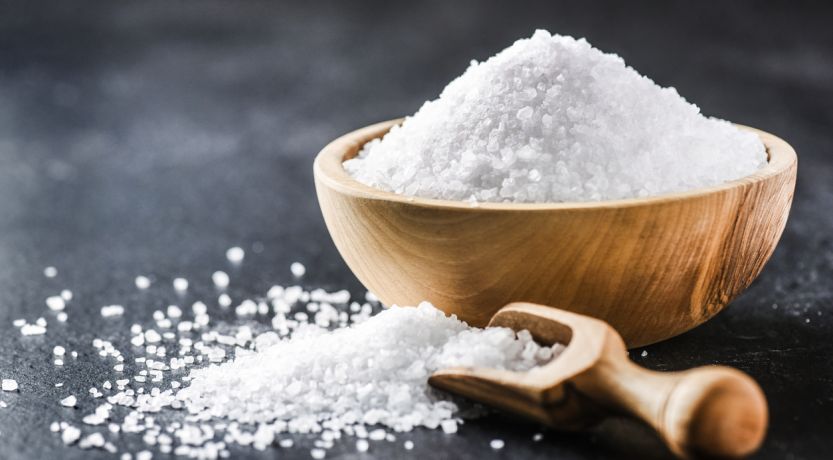What Does “Salt of the Earth” Mean? (The Meaning of Matthew 5:13)
The Bible calls the disciples of Jesus Christ “the salt of the earth.” What is the meaning of Matthew 5:13? What should Christians have in common with salt?

In three of the four Gospel accounts, Jesus connects His disciples to salt. In Matthew 5:13 He tells them explicitly, “You are the salt of the earth; but if the salt loses its flavor, how shall it be seasoned? It is then good for nothing but to be thrown out and trampled underfoot by men.”
But is that exactly what Jesus was describing? Are those things really the meaning of being “the salt of the earth”?
What exactly did Jesus mean when He called Christians the salt of the earth?
Other references to salt in the Gospels
We’ll start by looking at the two other instances where Christ talked about salt. In Mark 9:50 Jesus said, “Salt is good; but if salt loses its saltiness, how will it become salty again? Maintain salt among yourselves and keep peace with each other” (Common English Bible).
In Luke 14:34-35 He shared a similar thought: “Salt is good; but if the salt has lost its flavor, how shall it be seasoned? It is neither fit for the land nor for the dunghill, but men throw it out. He who has ears to hear, let him hear!”
In all three statements, we can see one clear theme emerge:
Salt is good only if it remains salty.
How does salt lose its flavor?
Technically, salt—the chemical compound of sodium chloride—can’t become “unsalty.” That aspect of salt never changes. Pure sodium chloride will taste like salt. From a chemistry perspective, unsalty salt is as possible as unwet water.
Jesus could have been using hyperbole and absurdity to make a point (see Matthew 7:3-4 for an example of this). But He also may have been referencing a common phenomenon that His listeners would have been familiar with.
“It is, of course, impossible for salt (sodium chloride) to lose its taste, but the salt in use in first-century Palestine was far from pure. It was quite possible for the sodium chloride to be leached out of the impure salt in common use so that what was left lacked the taste of salt. It was literally useless. It could not fertilize the land or even decompose usefully on the manure heap” (Leon Morris, Luke: An Introduction and Commentary, Tyndale New Testament Commentaries, Vol. 3, p. 254).
The end result in such a case would be, in essence, unsalty salt—totally useless and good for nothing “but to be thrown out and trampled underfoot by men.”
Could “salt of the earth” refer to fertilizer?
Luke’s account hints at one of the purposes of salt in Jesus’ time. Unsalty salt was “neither fit for the land nor for the dunghill.” Salt has an agricultural function. While too much can destroy a field’s ability to grow food (see Deuteronomy 29:23 and Judges 9:45), in small amounts, it can actually function like a fertilizer (and work in conjunction with animal manure).
In The Biblical Archaeologist, Eugene P. Deatrick argued that instead of “salt of the earth,” a better translation for Matthew 5:13 might be, “salt for the soil” (“Salt, Soil, Savior,” May 1962, p. 47).
A Christian without God’s presence and guidance in his or her life is just as absurd as unsalty salt—and just as useless.
From this perspective, a Christian’s job as “salt of the earth” or “salt for the soil” is to promote and stimulate the growth of good things. That’s certainly a biblical concept.
John the Baptist warned, “Every tree which does not bear good fruit is cut down and thrown into the fire” (Luke 3:9).
Jesus explained, “I am the vine, you are the branches. He who abides in Me, and I in him, bears much fruit; for without Me you can do nothing. If anyone does not abide in Me, he is cast out as a branch and is withered; and they gather them and throw them into the fire, and they are burned . . . By this My Father is glorified, that you bear much fruit; so you will be My disciples” (John 15:5-6, 8).
Christians who aren’t staying connected to God and growing are like salt without flavor. A Christian without God’s presence and guidance in his or her life is just as absurd as unsalty salt—and just as useless.
Salt’s chemical composition makes it unique, and our connection to God makes us unique. If we cut ourselves off from that connection, we cut ourselves off from everything that makes us capable of producing godly fruit in our lives.
How Christians function as the salt of the earth
Christ’s reference to the land and the dunghill in Luke 14:35 seems to indicate He had this fertilizing aspect of salt in mind when He called His disciples the salt of the earth, but it’s hard to be sure. If He was speaking in a more general sense—that is, if He was describing His disciples as salt sprinkled among the human race—then there are other qualities of salt to consider.
Salt is also a metaphor for the peace, graciousness and wisdom that allows us to interact with others in a godly way.
Without salt, food can be tasteless—and without salt, food can quickly rot. If Christians are the salt of the world, then our job is to make the world more palatable to God while being a force against corruption and decay. When we use God’s perfect law as the standard for how we live our lives, we accomplish both of those things.
In Mark’s account, Jesus equates having “salt among yourselves” to having “peace with one another” (Mark 9:50). Paul told the Colossians, “Let your speech always be gracious, seasoned with salt, so that you may know how you ought to answer each person” (Colossians 4:6, English Standard Version, emphasis added).
In these examples, salt is a metaphor for the peace, graciousness and wisdom that allows us to interact with others in a godly way.
Jesus asked, “When the Son of Man comes [returns to the earth], will He really find faith on the earth?” (Luke 18:8). As the salt of the earth, we should be committed to following in Christ’s footsteps. In the process, our Christian lifestyle will have an impact on the world the way salt has an impact on food.
When Christ returns to the earth, He should find His people doing their part to keep the world around them well-seasoned.
Did Jesus talk about tasteless salt—or stupid salt?
When Jesus asked what happens if salt loses its flavor, He was probably making a pun, but it’s difficult to spot in English. Where our English Bibles say, “if the salt loses its flavor” (Matthew 5:13), the original Greek manuscripts literally read, “if the salt becomes foolish.”
When we begin relying on our own wisdom instead of looking to God for guidance and instruction, we very quickly become tasteless (and foolish) salt.
That doesn’t make a lot of sense in English, but there are a couple factors at work here. First, it’s important to know that Jesus probably spoke primarily in Aramaic, which was the common language of first-century Judea. Second, salt appears to have often been used in rabbinic circles as a metaphor for wisdom. For instance, the Hebrew Scriptures are compared to salt in the Talmudic literature (Tractate Soferim 15:8).
The word Jesus likely used allowed for a “double entendre in Hebrew and Aramaic, where the verb tāpēl can mean both to be tasteless and to be foolish” (R.T. France, The Gospel of Matthew, The New International Commentary on the New Testament, p. 175). In other words, Jesus was probably asking two questions in one:
What happens when salt becomes tasteless? and What happens when wisdom becomes foolish?
Paul dealt with that second question in some of his letters to the early Church. He warned the Corinthians, “Let no one deceive himself. If anyone among you seems to be wise in this age, let him become a fool that he may become wise. For the wisdom of this world is foolishness with God. For it is written, ‘He catches the wise in their own craftiness’; and again, ‘The LORD knows the thoughts of the wise, that they are futile’” (1 Corinthians 3:18-20).
He also asked, “Has not God made foolish the wisdom of this world?” (1 Corinthians 1:20), explaining that “God has chosen the foolish things of the world to put to shame the wise . . . that no flesh should glory in His presence” (1 Corinthians 1:27, 29).
When we begin relying on our own wisdom instead of looking to God for guidance and instruction, we very quickly become tasteless (and foolish) salt.
What Christians have in common with salt and light
After describing His disciples as the salt of the earth, Jesus also called them “the light of the world” (Matthew 5:14), pointing out that no one lights a lamp only to hide it.
Salt that has no taste and light that cannot be seen—these things are useless. No, they’re worse than useless. They represent wasted potential. Salt that could have added flavor. Light that could have pushed back the darkness. Potentially life-changing—but instead, tasteless and hidden.
So are we.
The more we dedicate ourselves to following in Christ’s footsteps and living God’s way of life, the more effective we are at seasoning the world around us—and the brighter we shine.
Did you know we have a free 11-lesson Bible Study Course designed to help you extract deeper insights from God’s Word? Enroll today.
Date Posted: October 21, 2022



